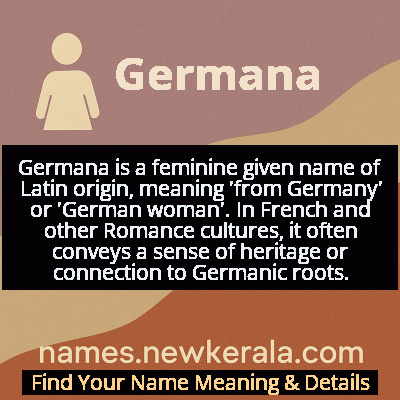Germana Name Meaning & Details
Origin, Popularity, Numerology Analysis & Name Meaning of Germana
Discover the origin, meaning, and cultural significance of the name GERMANA. Delve into its historical roots and explore the lasting impact it has had on communities and traditions.
Name
Germana
Gender
Female
Origin
French
Lucky Number
5
Meaning of the Name - Germana
Germana is a feminine given name of Latin origin, meaning 'from Germany' or 'German woman'. In French and other Romance cultures, it often conveys a sense of heritage or connection to Germanic roots.
Germana - Complete Numerology Analysis
Your Numerology Number
Based on Pythagorean Numerology System
Ruling Planet
Mercury
Positive Nature
Adventurous, dynamic, curious, and social.
Negative Traits
Restless, impatient, inconsistent, prone to indulgence.
Lucky Colours
Green, white.
Lucky Days
Wednesday.
Lucky Stones
Emerald.
Harmony Numbers
1, 3, 9.
Best Suited Professions
Sales, marketing, travel, entertainment.
What People Like About You
Versatility, charisma, adventurous spirit.
Famous People Named Germana
Germana de Foix
Queen Consort
Queen of Aragon, Valencia, Majorca, Naples, Sicily, and Sardinia as the second wife of King Ferdinand II of Aragon
Germana Cousin
Religious Figure
French shepherdess and Roman Catholic saint known for her piety despite physical suffering
Germana Sommaruga
Philanthropist
Swiss humanitarian and founder of multiple charitable organizations for refugees and marginalized communities
Germana Monte-Mór
Artist
Brazilian visual artist known for innovative multimedia installations exploring cultural identity
Name Variations & International Equivalents
Click on blue names to explore their detailed meanings. Gray names with will be available soon.
Cultural & Historical Significance
The name carries connotations of European unity and cross-cultural connections, reflecting the historical relationships between Germanic and Latin cultures throughout European history. During the 19th century nationalist movements, the name sometimes symbolized pan-European ideals and the shared cultural heritage of Western civilization. In contemporary times, Germana represents a connection to traditional European values while maintaining relevance in modern multicultural societies. The name's journey through different European courts and religious traditions makes it a fascinating study in cultural transmission and adaptation across centuries.
Extended Personality Analysis
Women named Germana are often perceived as strong-willed, resilient, and deeply principled individuals. Drawing from the name's etymological roots meaning 'brother/sister', they typically exhibit strong family loyalty and protective instincts toward loved ones. Historical associations with Saint Germana suggest qualities of perseverance through adversity, humility, and spiritual depth. Modern Germanas often display a blend of traditional values and contemporary thinking, making them adaptable yet grounded.
These individuals tend to be practical problem-solvers with a keen sense of responsibility, often taking leadership roles in family or professional settings. Their European origins lend them an air of sophistication and cultural awareness, while their strong character enables them to navigate challenges with grace and determination. Germanas are often described as having an inner strength that inspires confidence in others, combined with a warm, approachable demeanor that makes them excellent communicators and mediators in group settings. They typically value education, cultural enrichment, and maintaining strong family traditions while being open to new experiences and perspectives.
Modern Usage & Popularity
In contemporary naming practices, Germana maintains moderate popularity in Italy, Spain, and Portugal, while being relatively rare in English-speaking countries. The name has experienced a slight resurgence in recent years as parents seek classic European names with historical depth that stand out from more common choices. In Italy, it ranks around #350 in popularity, with stronger usage in northern regions near the Austrian and Swiss borders. The name appeals to parents valuing cultural heritage, religious significance, and timeless elegance. Modern Germanas often benefit from the name's distinctive yet accessible quality, standing out without being overly exotic or difficult to pronounce. The name's international flavor makes it particularly suitable for multicultural families, especially those with European connections or appreciation for Romance languages. While not among trending baby names globally, Germana maintains a steady presence as a sophisticated choice for parents seeking a name with historical weight and cross-cultural appeal.
Symbolic & Spiritual Meanings
Symbolically, Germana represents unity, resilience, and cultural bridge-building across European traditions. The name embodies the connection between individual identity and collective heritage, serving as a living link to centuries of European history and the complex relationships between different cultural groups. Its dual meaning of 'from Germany' and 'brother/sister' beautifully symbolizes both geographical roots and the fundamental human bonds that transcend national boundaries. The name carries powerful connotations of strength through adversity, directly inspired by Saint Germana's remarkable story of overcoming physical challenges and social rejection through spiritual fortitude and inner grace.
In a broader metaphorical sense, Germana represents the harmonious blending of different European cultural streams - particularly the Latin and Germanic traditions that have jointly shaped Western civilization. The name suggests a person who can skillfully navigate between traditions while maintaining strong personal values and integrity, making it symbolic of cultural diplomacy and the European ideal of 'unity in diversity'. For modern bearers, the name often becomes a personal emblem of resilience, cultural awareness, and the ability to find strength in one's heritage while embracing contemporary global citizenship.

